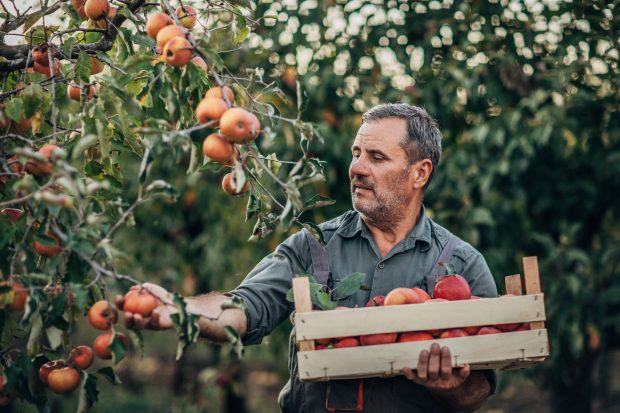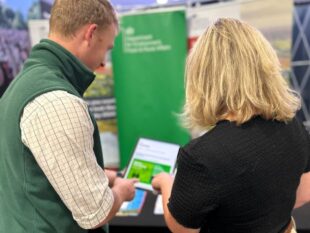
We plan to launch a new environmental land management scheme in 2024.
To keep things simple, the scheme is called Environmental Land Management,
Some elements of Environmental Land Management will be available from 2022. A national pilot will start in in 2021.
We are working with farmers and land managers to design the new scheme through a new programme of tests and trials.
We already have 3,000 farmers involved in helping us. Right now, we’re testing different elements of the scheme bit-by-bit in different tests and trials.
We will publish a list of them on this blog in the coming weeks. We’ll conduct a full test of the end-to-end approach in a national pilot from 2021.
What is Environment Land Management
Environmental Land Management replaces the agri-environment schemes currently available under the EU. It will pay farmers and land managers to deliver public goods that deliver benefits for the environment.
For example, this could be supporting the recovery of farmland bird populations or pollinators through greater use of nature friendly farming practices.
The scheme aims to build a new relationship with farmers. We know we need to allow enough flexibility for the scheme to work in all settings. We don’t want to keep telling farmers in huge detail what they can and can’t do, and we want this to work for people on the ground.
Instead, we want to set out the outcomes we want to achieve. We will rely more on farmers knowledge and understanding of their land and locality to determine the best way to deliver those outcomes
Tests and trials: a new approach
We’re taking an iterative approach with these tests and trials, because we think that will help us better understand how different parts of the new Environmental Land Management scheme should work. Many of the ideas we’re testing come directly from farmers themselves.
We’re working with farmers to test their ideas until we have a format that works. As we go along, we learn what works, what doesn’t and how we can improve.
For example, we’ve worked with a group of farmers in Northumberland to design and develop what land management plans could look like.
A land management plan is a new idea we are testing that will help farmers and land managers identify and record what environmental benefits they deliver. So far, most farmers who have tried it have given it an enthusiastic welcome. One called it “an essential tool”.
We have 68 tests and trials up and running with farmers and land managers across England. The tests and trials run for different lengths of time depending on what they cover, with some planned to run alongside the national pilot.
5 are already finished and from these we’ve gained valuable information to help us design the new. Quite soon, we’ll start publishing reports about these tests on GOV.UK.
So far, we've found:
- farmers and land managers really like the idea of using a land management plan, but they want the freedom to choose what format or template they use. A map and an assessment of the benefits they would deliver are critical components
- farmers would like to draw on advice to help them develop and monitor the plan
- farmers would like the opportunity to identify the local priorities for their area but to help them do this, they need access to the right data and information
- many farmers like the idea of different payment levels depending on what will be delivered. The payment system under the old EU scheme didn’t provide a strong financial incentive for farmers to get involved in the delivery of environmental benefits
- farmers like innovative approaches such as payment by results, as this gives them more flexibility to deliver environmental benefits on their land
If you would like to find out more, please get in touch with us at ELMtestingandtrails@defra.gov.uk



 The
The 
5 comments
Comment by Steve posted on
Interesting that this article is illustrated with an apple orchard - is horticulture fully included in the future plans?
Comment by Sarah Stewart posted on
Hi Steve. Thanks for visiting and taking the time to comment. I manage the blog. You raise a really important point and we will certainly give more thought to the pictures we use to illustrate posts. We are working with the team designing the Farming Investment Fund to ensure that horticulture is included as the scheme develops. It’s worth noting that producer organisations currently recognised in the Fruit and Vegetable Aid Scheme will continue to receive payments for the duration of their current operational programmes. Growers will also be able to access funding from the Farming Investment Fund in the same way as other farmers. There are plans for the Horticulture Team to talk more about their work in the new year, so do stay tuned!
Comment by David Reeve posted on
Hi Steve,
I am currently undertaking an MSc assignment that seeks to create an advisory sheet for farmers on one aspect farm system change to support a wider agroecologcal approach.
I am focussing on planting/management of small woods, tree clusters and hedgerows but in order to make it meaningful I would very much appreciate your opinion on when and how planning, change and funding can be achieved now, whilst firmly aiming it dovetail with the future thrust of incentives and support envisaged within ELM.
Comment by Mary Parker posted on
So disappointing that there is no mention of public access to the countryside. When the Countryside Stewardship Higher Level Payments were available there were some wonderful walking and riding networks opened up. All gone.
Comment by Sarah Stewart posted on
Hi Mary,
In the Agricultural Transition Plan you'll see that that through environmental land management schemes, government will incentivise farmers and other land managers to deliver public goods. Six public goods are listed. Public access is an important part of the last public good on that list: enhanced engagement with the environment.
We are in the process of developing our approach to making payments under the Environmental Land Management scheme with landowners.
Here is a link to the Agricultural Transition Plan which contains more detail: https://assets.publishing.service.gov.uk/government/uploads/system/uploads/attachment_data/file/954283/agricultural-transition-plan.pdf
We'll post updates as they happen.
Best wishes,
Sarah